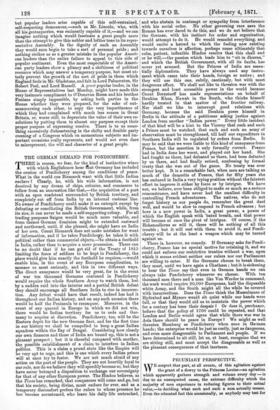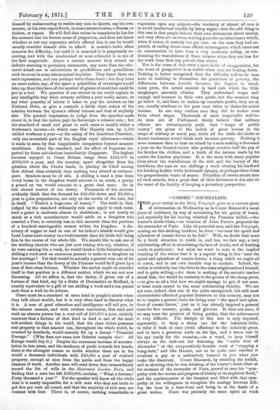PECUNIARY PERSPECTIVE.
WE suspect that part, at all events, of this agitation against the grant of a dowry to the Princess Louise—an agitation which apparently gathers strength and volume every day — is clue to an unsuspected cause, the extreme difficulty which the majority of men experience in reducing figures to their actual value,—in deciding what such and such a sum actually means. Even the educated feel this occasionally, as anybody may test for himself by endeavouring to realize any sum he knows, say his own income, or his own expenditure, in unaccustomed ceins,—francs, or thalers, or rupees. He will find that unless he translates he has for the moment lost his former sense of proportion, and does not know whether or not any expensive article offered him is one be would usually consider himself able to afford. A month's habit often removes the difficulty, but until it is removed it is perpetually re- curring, and with the uneducated or semi-educated it is one of the first magnitude. Above a certain amount they attach no definite meaning to pecuniary statements, any more than the edu- cated attach one to calculations in quadrillions and quintillions such as occur in some astronomical inquiries. They know there are such expressions, and can perhaps write them down ; but they have no more notion, say, of the space a quintillion of sovereigns would take up, than they have of the number of grains of sand that could be put in a hod. We question if one elector in ten could explain in any intelligible way what seventy millions a year really meant, or say what quantity of labour it takes to pay the interest on the National Debt, or give a comrade a fairly clear notion of the relation between the Queen's official income and that of anybody else. The general impression, to judge from the speeches made about it, is that the nation pays its Sovereign a colossal sum ; but the standard of small and great in such cases is usually either a workman's income—in which case Her Majesty eats up 3,500 skilled workmen a year—or the salary of the American President, only one seventieth part of the English royal allowance—which is made to seem by that inapplicable comparison beyond measure exorbitant. Alter the standard, and the effect of hugeness im- parted by these calculations immediately disappears. The highest incomes enjoyed in Great Britain range from £250,000 to £300,000 a year, and the country, apart altogether from the question about the Crown lands, in placing its Chief among that richest class certainly does nothing very absurd or extrava- gant. Symbols must be of silk. A shilling a bead a year from every house in the kingdom would amount to as much, a penny a pound on tea would amount to a great deal more. So in this absurd matter of the dowry. Thousands of the electors evidently think that the demand for £40,000 down and £6,000 a year is quite preposterous, not only on the merits of the case, but in itself. " There's a huge sum of money !" The truth is, that, judged by the standard ordinarily rich men apply to such cases, such a grant is moderate almost to shabbiness ; is not nearly as much as a rich manufacturer would settle on a daughter who married a Peer, is certainly less at this moment than the portions of a hundred marriageable women within the kingdom. A dis- covery of copper or lead in one of his father's islands would give Lord Lorne more money in a twelvemonth than his bride will bring him in the course of her whole life. We should like to ask one of the working electors who are just now raising this cry, whether, if he were earning 508. a week, he would think a little furniture and a shilling a week such an enormous present to make to a daughter on her marriage ? Yet that would be actually a greater sum out of his year's income than the dowry of the Princess would be if given by a man of first-class fortune. Whether the nation ought to consider itself in that position is a different matter, which we are not now discussing. All we affirm is, that the dowry, if given out of a fortune of that kind, say by a Duke of Devonshire or Bedford, is exactly equivalent to a gift of one shilling a week and a ten-pound note from a well-to-do artizan.
There must be a standard of some kind in people's minds when they talk about wealth, but it is very often hard to discover what it is. A man of good education and intelligence will tell you, in the calmest manner, and with evident conviction, that such and such an obscure person has a rent-roll of £40,000 a year, entirely unaware that a fortune of that kind in land is one of the most self-evident things in the world, that the class which possesses real property to that amount can, throughout the whole world, be counted by hundreds, would scarcely fill up a decent " Financial Peerage." (Why does not some new Debrett compile that? All Europe would buy it.) Despite the enormous increase of accumu- lation in late years, and the tendency of profit towards few hands, there is the strongest reason to doubt whether there are in the world a thousand individuals with £50,000 a year of realized property, exempt at once from the perils and from the happy chances of trade. Another man will read down that extraordinary record the list of wills in the Illustrated London News, and finding that a man has left £500,000, exclaim, " What a fortune! Forty thousand a year !" Yet the speaker will know all the while that it is nearly impossible for a rich man who does not trade to get five per cent. all round, and that the majority of rich men are content with four. There is, of course, nothing remarkable in
vagueness upon any subject--the tendency of almost all men is to avoid intellectual trouble by being vague—but the odd thing in this case is that people believe their own statements about money, and very often act on them, waiting years for an inheritance which, when it comes, is scarcely ten per cent. on the sum they had ex- pected, or raving about some official extravagance which turns out on examination to have been a very moderate outlay, or con- demning the wastefulness of State salaries when they are less for the work done than any private firm allows.
Nor is the cause of this error a mere habit of exaggeration, for the want of perspective is as visible when men are looking down. Nothing is better recognized than the difficulty well-to-do men have in realizing to themselves the gradations of poverty, the differences between humble incomes, the degrees in which taxes press, the actual amount in hard cash which the little shopkeeper annually obtains. They understand wages well enough and incomes in their own grade, but the moment they go below it, and have to reckon up uncertain profits, they are at sea, usually attribute to the poor man twice or thrice his actual income. In one very curious case they fail to realize even facts about wages. Thousands of most respectable well-to- do men out of Parliament firmly believe that military officers are extravagantly paid, that " heaps of public money " are given to the cadets of great houses in the shape of military or naval pay, while all the while old clerks or decent tradesmen would think such incomes poverty. Nothing is more common than to hear an attack by a man making a thousand. a year on the bloated rector who perhaps receives half the pay of his brother the civilian, and a tenth of the income made by his cousin the London physician. It is the same with many popular ideas about the wastefulness of the rich and the luxury of the fastidious, the man on ten shillings a week abusing his landlord for drinking Lafitte while he himself sips gin, at perhaps three times the proportionate waste of means. Prejudice of course enters into all such attacks, but a great deal of their bitterness is due also to the want of the faculty of keeping a pecuniary perspective.































 Previous page
Previous page